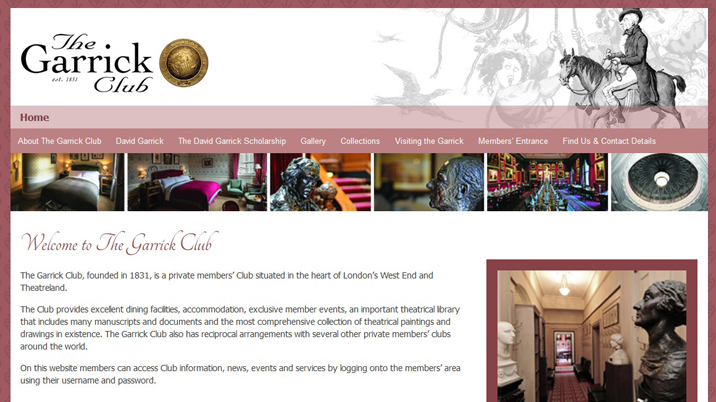
Gunning for the Garrick
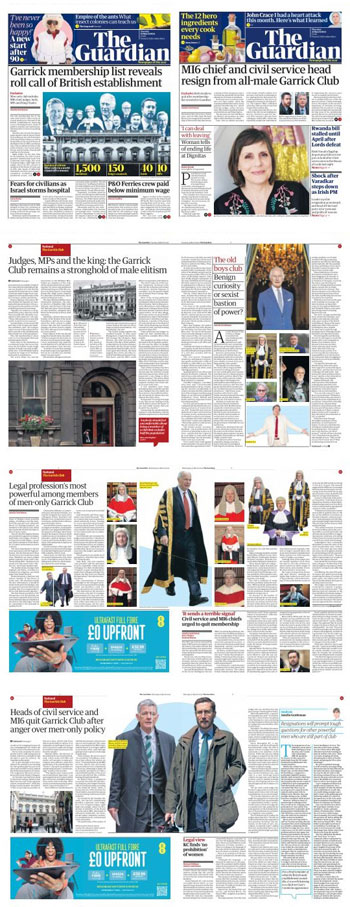
Just under half a century ago, the photographer Sheila Gray walked up to the bar in El Vino in Fleet Street and tried to buy a drink. She was refused service. Because she was a woman. And women could be served only when seated.
That had been the case for donkeys’ years, but this was a special day. The day the Sex Discrimination Act came into force – December 29, 1975 – a piece of law that was supposed to bring equality (or at least greater equality) to women. Gray took the wine bar to court. And lost.
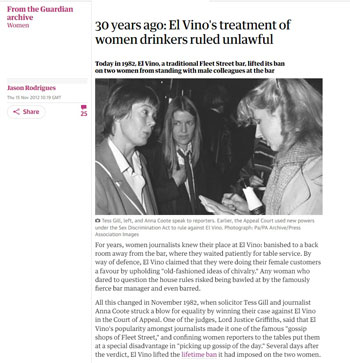
Six years later, the journalist Anna Coote and solicitor Tess Gill had another go. They also lost. But won their case on appeal in 1982. The appeal judges ruled that the table-service only rule for women denied them opportunities for networking and picking up gossip from male journalists and lawyers on the premises.
Now, 42 years on, the Guardian has decided to make a noise about another watering hole where male journalists and lawyers can network and gossip and where women cannot buy a drink. But there’s a difference. This is a private club: the Garrick, where membership is open only to men.
When I say, “make a noise”, I mean it: the splash and a spread, plus a week of follow-ups, including a second splash. First, here’s a list of members. Look how powerful they are. Is the old boys’ club a benign curiosity or a sexist bastion of power? Then, on day two, gosh! Here are a couple of judges we didn’t mention yesterday. Broadcasters picked up the story and there were a pair of early – and probably unexpected – high-profile scalps when the head of MI6 and the head of the civil service both resigned their membership.
All of this was the work of Amelia Gentleman, whose 2017 Windrush investigation was rightly recognised with the Paul Foot award and two Journalist of the Year titles. The thrust of this latest series has been to put forward much the same argument as Gill and Coote: that women are being put at a disadvantage by their exclusion from a forum populated by people of influence.
It certainly seems anachronistic, shocking perhaps. But so shocking that the Guardian editor regards this state of affairs as the most important world event on two days out of three and worthy of front-page note on the other? Really? This isn’t even close to the Presidents Club scandal, uncovered in 2018 by the FT’s Madison Marriage, where hostesses at the annual men-only dinner were groped and worse. It is fundamentally a story about men being able to join a club that doesn’t admit women as members. Women are welcomed as guests. Indeed, I am among a number of women who belong to a lunch club of ageing hacks who gather there every month to listen to a speaker of some note (Peter Mandelson is next up). My attendance record, alas, is woeful (ie, I’ve never turned up).
Still, the notion that there was a cage worth rattling was reinforced by Richard Moore and Simon Case swiftly making for the exit, followed by Robert Chote, former head of the Office for Budget Responsibility, and “at least” four judges as the “backlash” grew. It wasn’t that women were desperate to join, explained Gaby Hinsliff on Saturday:
“The problem with power is that it retreats. Force the door to the room where everything happens, and power slips away through a side door into a room you didn't know existed. As the visible professional sphere becomes more accessible not just to women but to all those previously under-represented, the value of these hidden spaces, exclusive to white men, may increase. It's not that we're necessarily desperate to get into your club. It's more that we learned the hard way to be suspicious of men who want to keep us out.”
It's a persuasive argument. But the Garrick is not the only gentlemen’s club in London, so why pick on it? Because it is populated by celebs and lawyers and politicos and, as such, is that bastion of white elite male power? If so, does that mean it would be ok if its members were all ineffectual nobodies? That you should be forced to include women only after you have built up a successful establishment that attracts male high-flyers?
And all this at a time when there is so much controversy about male intrusion into women’s single-sex safe spaces. Yes, that’s a different culture war. But does the Guardian think men should be admitted to the WI? Maybe it does. What’s the view on the gentlemen’s clubs’ female equivalents? Like the University Women’s Club, in Audley Square, which was founded in 1887 by the pioneering women’s rights activist Gertrude Jackson to “create a space for women who had been excluded from male-dominated universities to gather and pursue intellectual and social pursuits”. Jackson was setting up exactly the kind of establishment that the Guardian is decrying when it’s men who are doing the gathering in a single-sex space for intellectual and social pursuits.
Jackson may have been a trail-blazer, but plenty more have followed in her footsteps. To the extent that The Sybarite “luxury lifestyle” magazine this month published a list of the “five best women-only private clubs in London”. The University Club came out top, but what was more interesting was the fact that the other four had all been founded in the past twelve years. And they all sell themselves on being a place for influential women to network and do business (the latter being frowned upon at the Garrick).

Take the Sorority, which came in at number three, for example. It is described as “exclusive”, with members selected based on their achievements, expertise and potential to contribute to the community. “To be eligible to become a member, all prospects must demonstrate stellar credentials of having made notable contributions to any walk of life”. Emphasising again the club’s exclusivity, the write-up adds that the club provides a unique and empowering space for…successful women who can share knowledge, expertise, and opportunities, and support each other in achieving their goals.”
Would the Guardian approve or condemn?
I do see the point the Guardian is seeking to make. That diversity and equality will remain out of reach so long as powerful men (usually white men) are determined to deny women a seat at tables of influence. It’s a war that we shouldn’t still be fighting in the 21st century, yet there remain many battlefields between here and the horizon, from elite prep and public schools to urinals in offices across the country. I long ago realised that women would always be at a disadvantage so long as male rivals could stand shoulder to shoulder with the boss at his most vulnerable. But women are moving up the corporate and political ladders – the Guardian is, of course, edited by a woman – so the washbasins in the ladies’ can now also be a space for the ambitious to make a pitch to a nose-powdering exec.
So, while I sympathise with the overall cause, I guess I have three key issues with the Guardian’s little campaign.
First, it seems unfair to pick on the Garrick in particular, based on the fact that it attracts interesting and influential people, rather than on the principle of elite clubs in general.
Second, having lighted upon the Garrick, it was a bit rich not to mention until Saturday – four days after the first splash – that its members include Stanley Johnson, who happens to be the author’s father-in-law, a detail that has still not made it into the Guardian’s coverage.
But mostly, it just seems off-kilter to go gangbusters on a story like this. I get that if you’re going to make a difference and change things, you have to give your project top billing (my big gripe about the self-aggrandising coverage of the Post Office scandal after Mr Bates was that no one had given it any wellie before). So, in a way it had to be the splash or nothing. Gentleman wrote on day one that the paper had been banging this drum since 1966, so a spread in the Journal section wouldn’t have done the job. But, really? One private members’ club out of 50-odd in London? There are so many important issues, so many greater injustices, far more deserving of the Guardian’s premium news space.
The paper has undoubtedly stirred a wider, and perhaps necessary, debate. But in doing so it has made itself appear small-minded, petulant even, like a foot-stamping child wailing “It’s not fair”. And that diminishes its voice when it comes to those matters of greater moment. Like this morning’s splash on sewage being spilt into our rivers and seas.
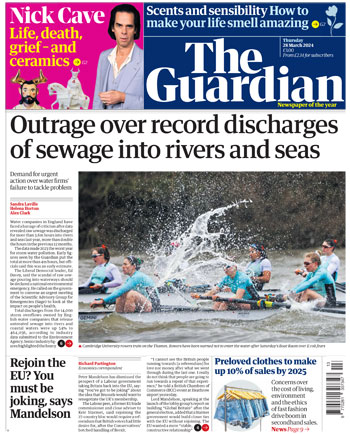
I agree with Boris
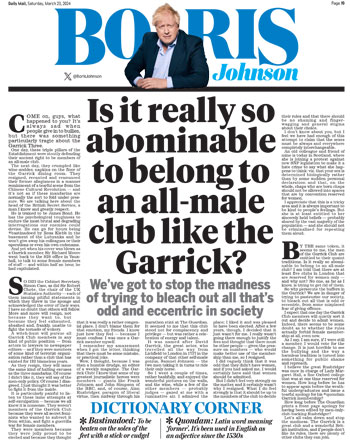
I don’t often agree with Ms Gentleman’s brother-in-law, but I thought he was spot on in the section of his Mail column at the weekend that pooh-poohed Moore, Case and Chote, who had all claimed to be “fighting for change from within”, hours before resigning from the Garrick. Savour this Notebook one-off: a lengthy quote from another former member, B Johnson Esq, who predicted a wave of resignations from the club as though it were “some terror organisation”:
“As they resign, they will issue the same kind of halting excuses as the three mandarins. Of course I didn't like it, they will say of the men-only policy. Of course I disagreed. I just thought it was better to fight it from the inside.
“It is particularly painful to listen to these lame attempts at self-exculpation – because we all know it is nonsense. They weren't members of the Garrick Club because they were all secret feminists who wanted to subvert it from within, and fight a guerrilla war for female members.
“They were members because they were jolly proud to be elected and because they thought that it was really a rather congenial place.”
Oh, and by the way, Boris didn’t mention that Amelia is his sister-in-law.
Misleading headline # 1: Dangerous dieting
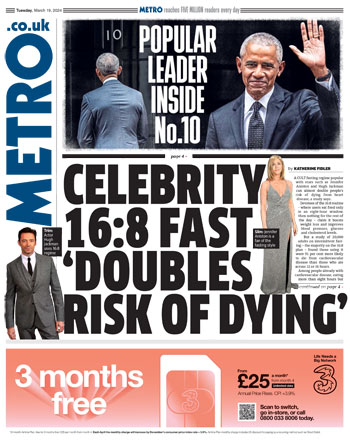
I’ve been fighting a losing battle with my body for more than half a century, with only a couple of minor triumphs along the way. The skirmishes have included regimes dreamt up from Cambridge (very low calorie soups) and California (naked beefburgers with cottage cheese). I’ve considered and rejected the F-plan and Ducan, Hay and Atkins, preferring to preach (but rarely follow) low-carb, low-fat, low-alcohol regimes. Like most failed dieters, I know what works, I just don’t want to give up the bread and booze.
One vogue that did capture my attention for five minutes, though, was the idea of intermittent fasting. Not the five days eating, two days starving version. But the one that says you should do all your eating in an eight or ten-hour window. By giving it a go, according to a Metro splash last week, I have now doubled my risk of death. Of course, you can’t double an absolute – we’re all going to die – so I guess it meant dying before I would have done had I not dabbled with the fasting.
But even with that adjustment, was it true? Here is how the paper told the story:
“A cult fasting regime popular with stars such as Jennifer Aniston and Hugh Jackman can almost double people's risk of dying from heart disease, a study says.
“Devotees of the 16:8 routine - where users eat food only in an eight-hour window, then nothing for the rest of the day - claim it boosts weight loss and improves blood pressure, glucose and cholesterol levels.
But a study of 20,000 adults on intermittent fasting - the majority on the 16:8 plan - found those using it were 91 per cent more likely to die from cardiovascular disease than those who ate across 12 or 16 hours.”
Well, the figures were compelling and came from a respected (though very young) scientist. There were a lot of people in the trial, a summary of whose results was presented to the American Heart Association in Chicago. The session was about epidemiology, prevention and lifestyle and the point of the study had been to see whether there were health benefits to fasting regimes. Professor Victor Zhong said that he had expected time-limited eating to be associated with lower cardiovascular death risks and so was surprised by the results.
A reasonable story. Certainly one of great interest to a great many readers. But where were the details of the trial – and its results? Was this a case of cause and effect or just a link – a difference many journalists find hard to understand? Zhong has yet to publish his full paper and have it peer-reviewed. But what he did tell the seminar was that the subjects of the trial were asked to record their eating practices for just two 24-hour periods over a number of years.
They were not monitored, the researchers just took their word. They were not asked what they had eaten during those two 24-hour periods, just the time frame. They could have binged on pizzas and Coke and cake for eight hours. They could have been following the regime for years or just the two days in question. They might have had eating disorders, addictions, been morbidly obese or dangerously skinny. Some might have been put on strict diets by their doctors because of other health issues that put them at risk of heart failure. None of this was addressed in the summary, though it may be in the full paper.
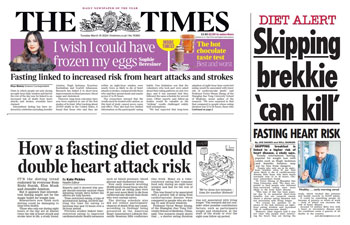
Metro simply reported what Zhong said in his summary and stuck a couple of big names in the intro. The Sun gave the research a 250-word page 11 lead headlined “Skipping brekkie can kill”, but did at least use the phrase “is linked to a higher risk of heart disease”. The Mail, too, was more cautious with “could double heart attack risk”. The Times did best, recognising it as a front-page story, but using the key word “linked” in the less compelling but more reliable heading. Like everyone else, it mentioned Jennifer Aniston high up, but it also spelt out all the caveats both within the news story – courtesy of other scientists’ interpretations of the findings – and in Rhys Blakely’s sidebar analysis. Good job.
Incidentally, I found a candidate for Private Eye’s Malgorithms feature in the UPI coverage of the study, under the heading “Intermittent fasting each day boosts risk of cardiovascular death, research reveals”. Boosts risk? Is this what we’re aiming for? In which case, the advertiser has a regime to help you on your way. Some of these even go so far as to recommend restricting the eating window to six hours. Will that triple the risk of death?
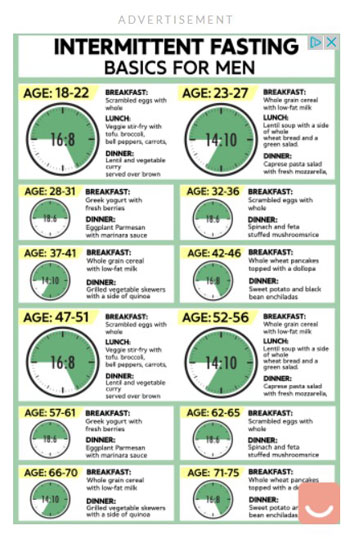
Misleading headline # 2: Energy bills
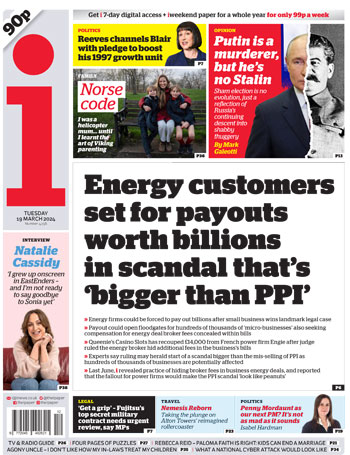
Metro may have misled readers with that splash, but it’s probably fair to say it wasn’t intentional. It was more a sin of over-interpretation than misinformation.
I wish I could say the same for the i and its splash “Energy customers set for payouts worth billions in ‘scandal that’s bigger than PPI’”. This sounds huge. We all remember PPI and those endless emails and phone calls urging us all to see if we were entitled to thousands in compensation. If this was going to be bigger than that, how come this is the first we’ve heard of it?
Because when you see the words “energy customers” you think it means people like you, don’t you? Or do you? Wouldn’t a snappy headline writer have used a word like “families” or “households”? Of course they would. This story was about business customers. But there is no doubt what the team that put that page together wanted the casual buyer to think.
Privacy request falls on deaf ears
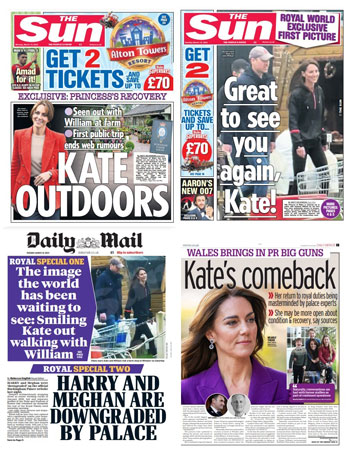
There was more mis-selling at the start of last week with the “return of Kate”. On Monday, the Sun had a photograph of her on the front with the headline “Kate outdoors”. But the picture was a file shot. She had been to a farm shop. But she didn’t feature in the little inset picture showing said shop.
The next day, the Mirror was also offering file shots on both the front and inside with “Kate’s comeback”, to accompany an “exclusive” on how PR big guns were masterminding her return to royal duties. The Mail went for a double-header (cheer Kate, boo Meghan), topped off with “the image the world has been waiting to see”: a still from the amateur video of the Waleses visiting that farm shop, which was by now a “World Exclusive” all over the front and inside of the Sun. For the Mail, “laughing with William and carrying her own shopping” was proof that Kate was on the mend.
The Mirror finally caught up with the farm shop outing on Wednesday – labelling them “first pictures” – but at the same time stole the march on everyone else with the allegations that unauthorised hospital staff were trying to access the Princess’s medical notes.
Of course, as we now all know, this was not “Kate’s return”. Any more than the doctored mothers’ day photograph showed her as a “picture of health”. You really would have thought that they would have learnt by now not to jump to conclusions – remember that “hale and hearty” King in Sandringham the day before he withdrew from public-facing duties to undergo cancer treatment.
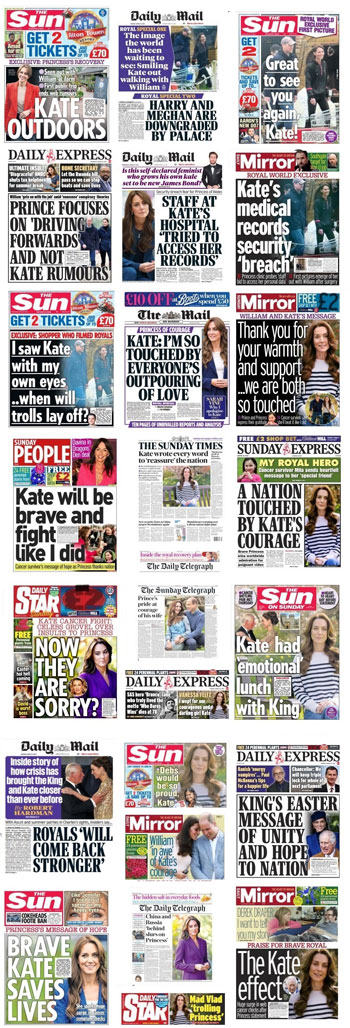
The Princess could not have been more explicit in her request for privacy than she was in that garden bench video.
Former Sun editor David Yelland tweeted that he had been moved by her courage, leadership and love and concluded: “Her privacy must be respected and will be. She has reset the world view, reset all media, reset the conversation.”
How I hoped that he would be right, but my suspicion was that the front pages would be promising the “full story” on pages 2-21. I was wrong. The Mail and Sun managed only ten apiece. But it was a Friday and they had been given only an hour’s advance warning of the broadcast. Of course this was a huge story and had to be on every front page. But, excluding the Saturday coverage, look at how many Kate covers there were in the ten days surrounding the announcement.
The Sundays obviously went biggest. The Mail had a “Royal special” with “ten pages of unrivalled reports and analysis” – including Sarah Vine, as usual, making it all about her. The Sun fulfilled my “full story” prophecy, but only on pages 2,3,4,5,6,7,8,9 and 27. And the splash? An exclusive (of course) “Kate had ‘emotional’ lunch with King” – according to “insiders”. So, the paper was respecting the princess’s privacy by intruding on a private lunch with her father-in-law.
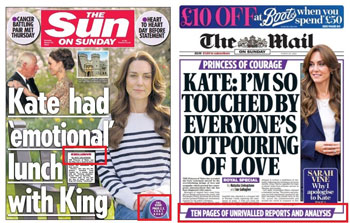
Next day, the Mail was back with Robert Hardman on the “inside story of how crisis brought the King and Kate closer than ever before”.
Oh, and Harry and Meghan got it all wrong. How dare she launch a new business (which, according to the Mail and Times, looks like a rip-off of another mega-pricey California lifestyle offering) in such a week? A week, you might recall, in which the Sun, Mail and Mirror had been telling us that Kate was up and about and well on the road to recovery.
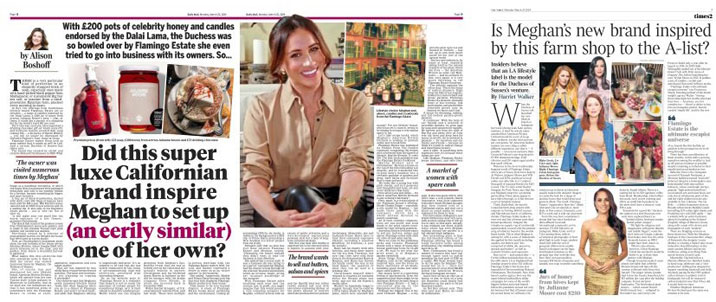
What is the message here? Are the Waleses and the Sussexes so estranged that they didn’t know about Kate’s state of health? All the vibes in recent weeks have been that William is refusing to talk to his brother. Or has there been enough of a rapprochement that they did know, but showed how callous they are by going ahead with this super-Goopy enterprise? Surely the papers can’t have it both ways? But they can. And then get A N Wilson to write a column telling Harry to modify his behaviour.
Five days on and they were still not letting go. We’d had Sarah Vine’s apology and Allison Pearson speaking for the “whole nation”. Now here was Vanessa Feltz in the Express telling us about how she coped presenting a two-hour TV special after the broadcast of the video. Poor Vanessa did a lot of weeping. The headline said, “Let Kate recuperate in peace”, but it wasn’t clear who was being instructed to leave her in peace. It certainly wasn’t in the text below, which wished her a speedy recovery, but said nothing about leaving her alone.
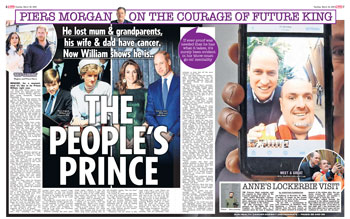
While Vanessa was busy weeping for “our darling Kate”, the Mirror and Sun had the NHS and cancer charities hailing the “Kate effect” – the fact that thousands of people were turning to their websites to see if they, too, had cancer. “Brave Kate saves lives” as the Sun put it. It also had Piers Morgan weighing in on the “courage of the future king”, in other words, a man was looking after his sick wife and caring for his kids while holding down a job. Yes, he’s having a tough time of it and few of us would wish to be in his shoes. But that is sort of what many husbands and fathers (without an army of staff to help) do without being awarded a medal for gallantry. Still, the real point of the essay was not to pay tribute to William, “the People’s Prince” (see what he did there?), but to throw a few more buckets of manure over Harry and Meghan.
Meanwhile, the Star was playing catch-up to report what everyone else was saying on Monday – that “Mad Vlad” was trolling the princess. And the Telegraph was taking readers “inside the royal recovery plan”.
(The Guardian was too busy reporting the resignation of four “senior” judges from the Garrick. But it did also have a proper splash – the Security Council Gaza ceasefire resolution. The Telegraph and Times gave that only a nib on their fronts.)
But back to Kate. We are constantly reminded that it isn’t the press, but the vile online trolls who do all the damage and cause all the grief. Indeed, by Monday, the government was accusing China, Russia and Iran (it would be those three, wouldn’t it?) of peddling conspiracy theories about the princess to destabilise the country. Funny how their alleged activities didn’t trouble the front pages when the claims were that they were interfering in the Brexit referendum and the Trump election. But come Tuesday, everyone was in a tizz over Chinese cyberattacks against politicians, journalists, academics and “millions of voters” all over the world.
I’m not excusing the social media monsters, who are undoubtedly the bigger sinners. As Hugo Rifkind wrote in the Times this week, it wasn’t the papers but “you” – ie, the internet-using public – who fuelled the rumour mills. By old benchmarks, the newspapers have sought to show a level of restraint. Yet in the four days after her announcement, the princess featured on 127 national news pages and in 40 feature, opinion and leading articles (the Sun topped the list with 32 Kate pages). There were undoubtedly a number of genuine elements to consider, but I’m not sure we needed quite so many “I’m so sad” personal reflections, the homespun advice or all those “inside stories”.
For to talk on one day about respecting privacy and then to churn out page after page of “insider” gossip and “how will they cope?” speculation the next – however well-intentioned – rather misses the point. Privacy means not being talked about at all; not just not being sniped at.
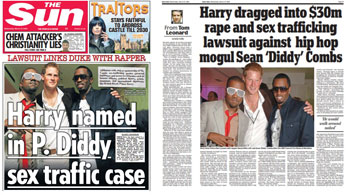
Yesterday she was nowhere. There were other distractions: Harry was back in the spotlight, being linked to the Sean Combs court case, and the King is reportedly hoping to be out and about this Easter weekend. But maybe, just maybe, Kate was absent because the press had got the message. And maybe, just maybe, the papers could consider showing the same level of understanding to others? Meghan may have a long wait. But we can only hope.
Hypothetical scoop of the year
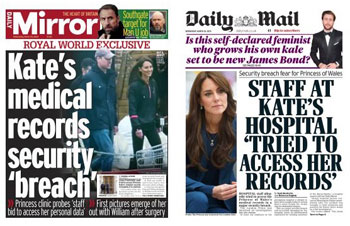
One last thought about the Kate coverage over the past couple of weeks: the Mail must have been spitting feathers. First it was scooped by the Sun with the farm shop video, while it was busy trawling the lower reaches of the Palace websites to find some dirt on the Sussexes. Then it was scooped by the Mirror on the hospital notes investigation. It caught up with that one on the night and appeared to save face, but had to use the dreaded phrase “told the Daily Mirror”. I bet there were some ripe words in Derry Street.
And the million-dollar question: if anyone had got at those notes and gone to the tabloids with the one key fact, would they have published?
Press indifferent about proposed football regulator
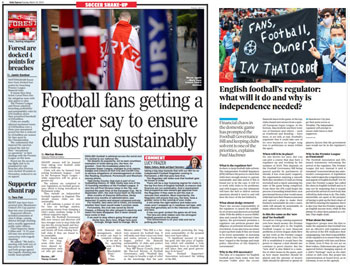
Should a government legislate to impose an independent regulator on a sector in which private businesses serve a large proportion of the population? Well, we have them for the water and energy companies. And for broadcasters and financial institutions. How effective they are is an open question. Last week, legislation was introduced to create a football regulator – to “give the game back to the fans”, to make sure that the sport’s riches are distributed fairly. The idea was welcomed by those who don’t like the way the Premier League operates and denounced by those destined to be regulated. So far, so predictable.
What did the press make of this? Not a lot. A Guardian leader thought it was a good idea, the Observer’s Paul McInnes set out to explain what it would do. Other papers were less interested, leaving it to sports writers to discuss it almost as a fait accompli. Only the Express gave it anything like a good show on the news pages (possibly because culture secretary Lucy Frazer had offered a comment piece to advance her case).
But shouldn’t the press be examining whether it is right for independent private businesses who are providing “fun” rather than essentials – businesses that might charge a lot of money for what they sell, but are not going to gamble recklessly with people’s life savings – to have their activities monitored and possibly curtailed at the behest of government?
If greater oversight is needed, should they not perhaps be persuaded to set up some form of self-regulation? It works for doctors, lawyers, advertisers.
Do you see where I’m going with this? Do you remember the reaction to the post-Leveson idea that the government might impose a system to create an independent regulator for the press? It was anathema. It was a threat to democracy. It was state control of a free press.
In fact, the state wasn’t going to oversee the press; the independent regulator was supposed to do that. All the government was proposing was to set up a framework to create such a regulator. I didn’t see it like that at the time, and added my small voice to the much louder ones of the organisations that would have been so regulated. They kicked up an almighty stink, refused to sign up and the whole idea died in the water, with only a few smaller publications opting for oversight by the formally recognised authority. For the big boys, the old system continued, with minor tweaks and a new name, and the same media groups are still in the driving seat.
So what surprises me is not that the papers didn’t look at the putative football regulator and draw parallels pointing to the road to hell. Or that they endorsed this supposed new route to nirvana that they would never accept for themselves. But that our football-obsessed press barely reported it at all.
Obama at No 10
I had a little moan above about the Metro diet splash. So, to counter-balance, I’d just like to say I thought this headline on Obama’s visit to London rather neat.
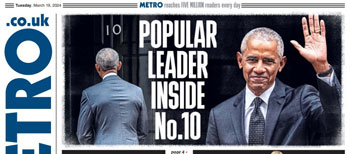
Hitting the spot
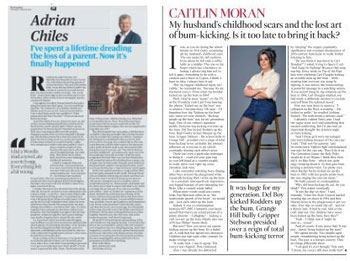
Columnists come in for a lot of stick – faux wisdom, “common sense” that is a mask for prejudice, self-absorption, political propagandising – so putting fingers to keyboard can be nerve-racking and reading the BTL comments downright frightening. Sometimes a writer hits the mark in the sense that you go “that’s exactly what I was thinking” or, conversely, “I never thought of it that way before”. Or makes you laugh out loud by skewering a target with three perfect words of satire. But two pieces that fall into none of these categories have struck me this past fortnight.
One was Adrian Chiles in the Guardian on the death of his father. This is not an unusual subject for 50-something writers – I particularly remember Margaret Foster’s brilliant book Have the Men Had Enough, on coping with her mother-in-law’s Alzheimer’s, and Janice Turner on her parents’ decline. Chiles’s effort was in the same league, finding wider truths in personal trauma. A lovely line was, “I suppose the thing about a deathbed is that you don't want to be on it for too long. For a while it felt as if he was stuck between a life he didn’t want to live any more and a death he didn't want to die.”
Maybe it resonated because he perfectly articulated the recent experience of my husband (of a similar age to Chiles) in coping with the death of his father (like Chiles’s dad, in his late eighties). The old man cherishing life, yet knowing it could no longer be lived as it was; the son’s anguish at the indignity of a sippy cup.
Or maybe it was just a good piece of journalism.
On a completely different level was Caitlin Moran in the Times Magazine the weekend before last. This was a completely inconsequential piece about the phrase – and execution of – a kick up the bum. An 850-word riff that took us from husband Pete Paphides’s school playground to Grange Hill and Del Boy’s Peckham via Fawlty Towers and Kung Fu Fighting on Top of the Pops. Until Style Council and the advent of the slip-on shoe spoilt the fun. Barking mad and an absolute joy. By quite a margin my favourite read of the week.
Front page of the fortnight
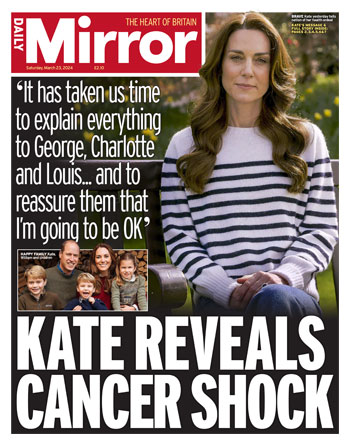
When you get a big, late story like the Princess of Wales’s announcement, you expect the papers to put on their best show. They nearly always surpass their performances on the set-piece occasions – such as the Coronation – when there’s almost too much time to think and tinker, too much focus on the “mood-setting” headline that will set the title apart.
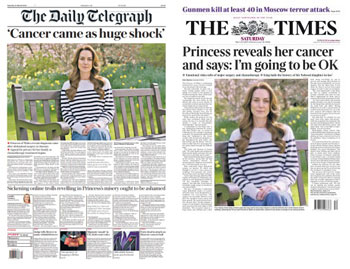
Last Saturday, most did not disappoint. The Times and Telegraph were sober, the tabloids emotional – but not mawkishly so. I found it hard to pick a winner between the Sun, Express and Mirror – all of which junked their Saturday puffs to the great benefit of the final product. In the end, the Mirror just edged it (as ever, this is my own personal opinion, not some authoritative judge pontificating).
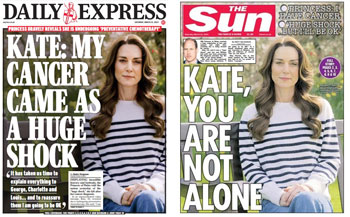
The less monarchy-obsessed i and Star reined back (the latter couldn’t let go of the free bet); the Guardian kept the entire Saturday package in place. It knows it has many republicans in its readership and made its judgments accordingly. But the “Easter feast special” still jarred.
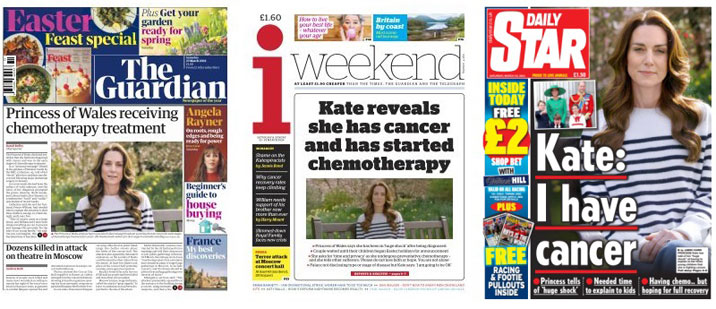
The easier task would have been to pick a worst front for that day. Here – again, my personal opinion – the Mail took the title hands down. Too much type and, as ever, it was more about what its writers thought than what the real subject of the story had to say for herself.
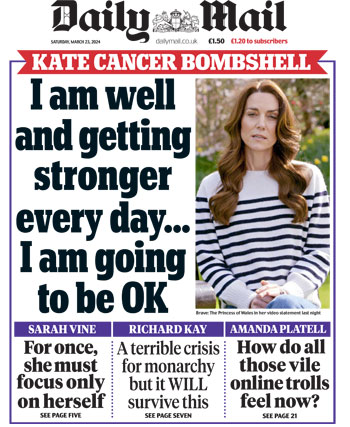
Liz Gerard’s Notebook is a fortnightly column published in the InPubWeekly newsletter. To be added to the mailing list, enter your email address here.












